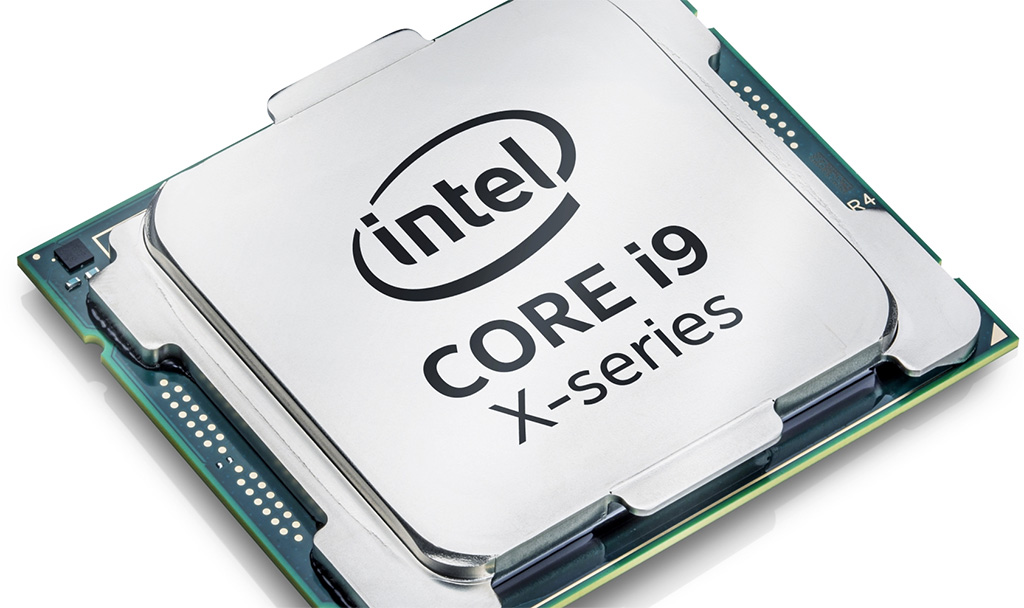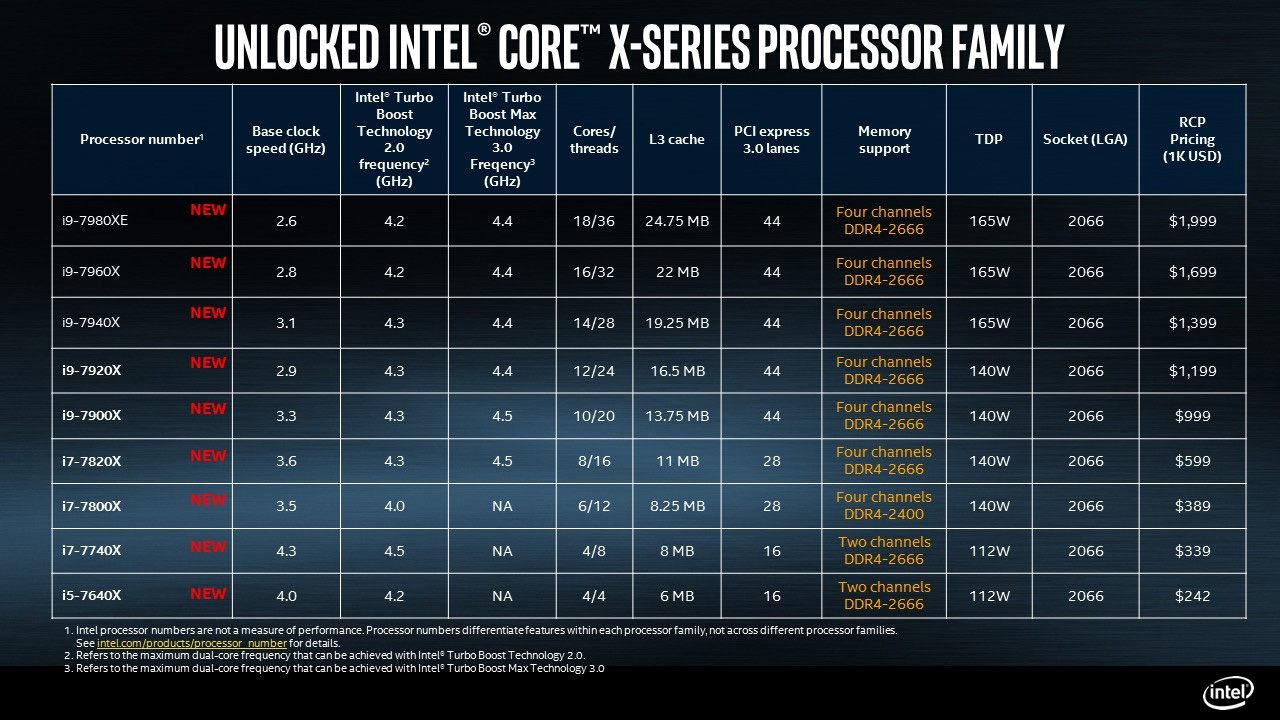Full details for Intel's Core i9 processor lineup
No more guessing clockspeeds.

Intel is finally ready to share full specifications for its higher-end Core i9 (Skylake-X) processors, including its flagship Core i9-7980XE, an Extreme Edition chip with 18 physical cores and 36 threads.
Up until this point, Intel had only revealed speeds and feeds for its Core X-series up through the Core i9-7900X, a $1,000 10-core/20-thread CPU clocked at 3.3GHz to 4.3GHz (4.5GHz via Turbo Max 3.0). Intel listed higher-end processor options as part of its Skylake-X lineup, but only shared core/thread counts and pricing. Now we have details for the entire lineup:

The Core i9-7980XE features a 2.6GHz base clockspeed. That's not terribly exciting, though we're not real concerned with base clocks since Intel's chips do a good job of hitting Turbo clocks as needed. In that regard, the Core i9-7980XE has a Turbo clock of 4.2GHz, and can hit 4.4GHz in single-threaded workloads. Those are both 100MHz lower than the maximum we've seen on Skylake-X, which is good to see.
The Core i9-7980XE will also have 24.75MB of L3 cache, the most of any Core X-series chip, along with 44 PCIe lanes and a 165W TDP. Of course, you have to pay to play in the deep end—in this case, the asking price is $1,999.
Moving down the list, Intel also filled in the blanks for its Core i9-7920X, Core i9-7940X, and Core i9-7960X processors. Turbo clocks are pretty consistent throughout the entire Core i9 family, which means that real-world performance will largely depend on how well an application takes advantage of multiple cores and threads.
These are all unlocked processors, meaning buyers will be able to try and push clockspeeds higher than Intel's official specifications. That said, we don't anticipate there being a ton of headroom on the Core i9-7980XE, at least compared to the CPUs that sit underneath it.
But the above slide only gives the base and maximum Turbo Boost clockspeeds. The complete official 'stock' clocks for various core loads are arguably more important, and Intel provided us with that data as well. Here are the core load Turbo Boost 2.0 clocks for the full line of Skylake-X parts, for reference:
The biggest gaming news, reviews and hardware deals
Keep up to date with the most important stories and the best deals, as picked by the PC Gamer team.

Combining this table with the above slide from Intel, most of the higher end Core i9 parts don't give up more than 100MHz at any given core load compared to lower tier models. For example, the 10-core i9-7900X hits 4.0GHz on all cores, while the i9-7980XE and i9-7960X both hit 3.9GHz on up to 12-core workloads. Moving beyond that, there's a drop of several hundred MHz at 13-16 core loads, and then the i9-7980XE drops a final 100MHz for 17-18 core loads.
The important factor here is that, even with all 18 cores loaded, the i9-7980XE will hit 3.4GHz, and at 16-core loads the 7980XE and 7960X can do 3.5/3.6GHz, respectively. That matches or exceeds the stock clockspeeds for AMD's Threadripper 1950X, which was almost certainly the point Intel wanted to make.
It will be interesting to see how well these sell now that Intel is facing competition in the high-end desktop (HEDT) processor space. Intel claims its reasoning for offering an 18-core desktop chip is that its 10-core Broadwell-E was received "really well" by enthusiasts. Even if we are to take that at face value, this time around Intel is competing with aggressively priced HEDT processors from AMD.
Consider that the Ryzen Threadripper 1950X with 16 cores and 32 threads has just two fewer cores than the Core i9-7980EX, but costs half of as much. And against the 16-core/32-thread Core i9-7960X ($1,699), it's still $700 less expensive. Not coincidentally, AMD's Threadripper parts also launch this week, on August 10.
Of course, none of this matters all that much for gaming, at least currently. Despite Intel's claims that "gamers and enthusiasts will experience up to 30 percent faster extreme mega-tasking for gaming over the previous generation," today's games simply don't take full advantage of the cores and threads that are offered by these HEDT chips. That 30 percent figure comes from doing numerous other tasks in the background, like complex video transcoding or 3D rendering, something most gamers don't do.
Intel is planning to release the Core i9-7920X on August 28. The Core i9-7940X, Core i9-7960X, and Core i9-7980XE will be available starting September 25.
Paul has been playing PC games and raking his knuckles on computer hardware since the Commodore 64. He does not have any tattoos, but thinks it would be cool to get one that reads LOAD"*",8,1. In his off time, he rides motorcycles and wrestles alligators (only one of those is true).


